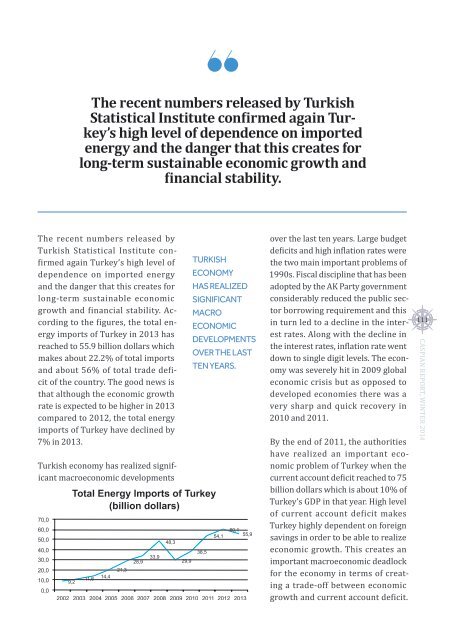Caspian Report - Issue 06 - Winter 2014
Create successful ePaper yourself
Turn your PDF publications into a flip-book with our unique Google optimized e-Paper software.
The recent numbers released by Turkish<br />
Statistical Institute confirmed again Turkey’s<br />
high level of dependence on imported<br />
energy and the danger that this creates for<br />
long-term sustainable economic growth and<br />
financial stability.<br />
The recent numbers released by<br />
Turkish Statistical Institute confirmed<br />
again Turkey’s high level of<br />
dependence on imported energy<br />
and the danger that this creates for<br />
long-term sustainable economic<br />
growth and financial stability. According<br />
to the figures, the total energy<br />
imports of Turkey in 2013 has<br />
reached to 55.9 billion dollars which<br />
makes about 22.2% of total imports<br />
and about 56% of total trade deficit<br />
of the country. The good news is<br />
that although the economic growth<br />
rate is expected to be higher in 2013<br />
compared to 2012, the total energy<br />
imports of Turkey have declined by<br />
7% in 2013.<br />
Turkish economy has realized significant<br />
macroeconomic developments<br />
TURKISH<br />
ECONOMY<br />
HAS REALIZED<br />
SIGNIFICANT<br />
MACRO<br />
ECONOMIC<br />
DEVELOPMENTS<br />
OVER THE LAST<br />
TEN YEARS.<br />
over the last ten years. Large budget<br />
deficits and high inflation rates were<br />
the two main important problems of<br />
1990s. Fiscal discipline that has been<br />
adopted by the AK Party government<br />
considerably reduced the public sector<br />
borrowing requirement and this<br />
in turn led to a decline in the interest<br />
rates. Along with the decline in<br />
the interest rates, inflation rate went<br />
down to single digit levels. The economy<br />
was severely hit in 2009 global<br />
economic crisis but as opposed to<br />
developed economies there was a<br />
very sharp and quick recovery in<br />
2010 and 2011.<br />
By the end of 2011, the authorities<br />
have realized an important economic<br />
problem of Turkey when the<br />
current account deficit reached to 75<br />
billion dollars which is about 10% of<br />
Turkey’s GDP in that year. High level<br />
of current account deficit makes<br />
Turkey highly dependent on foreign<br />
savings in order to be able to realize<br />
economic growth. This creates an<br />
important macroeconomic deadlock<br />
for the economy in terms of creating<br />
a trade-off between economic<br />
growth and current account deficit.<br />
111<br />
CASPIAN REPORT, WINTER <strong>2014</strong>










